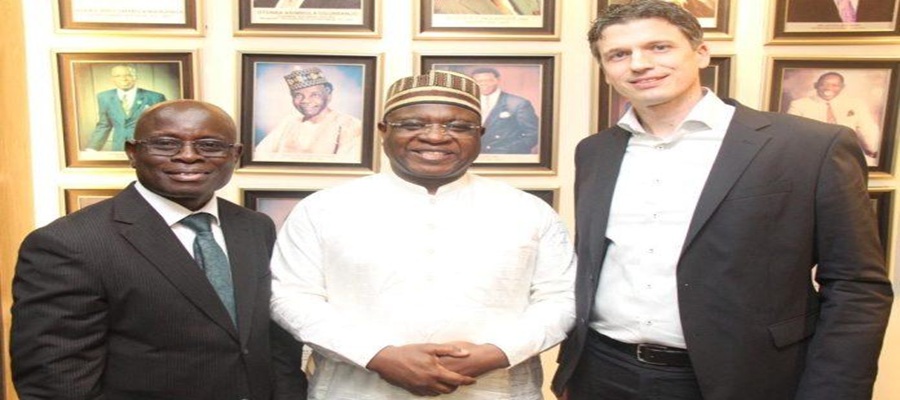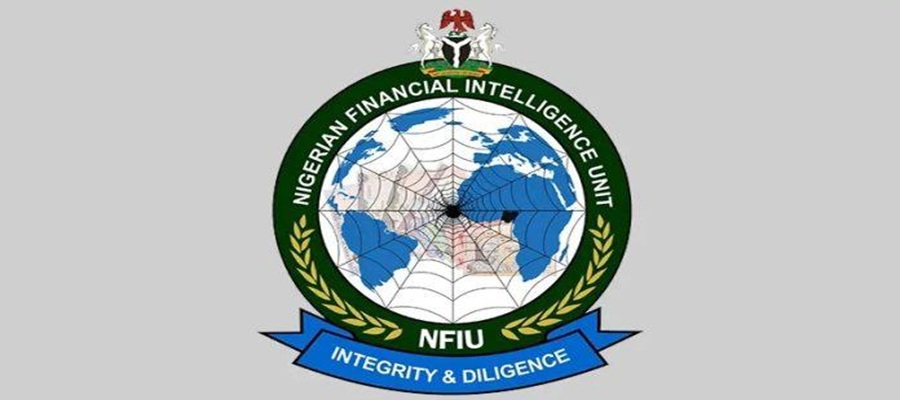News
SERAP Asks NASS to Identify Lawmakers Involved in Missing N4.1Bn

Socio-Economic Rights and Accountability Project (SERAP) has asked the leadership of the National Assembly to probe the N4.1 billion budgeted for the parliament alleged to be missing.

SERAP in a letter addressed to Mr Ahmad Lawan, Senate president and Mr Femi Gbajabiamila, speaker of the House of Representatives.
In the letter dated May 15, 2021, and signed by Mr Kolawole Oluwadare, SERAP deputy director, the parliament was asked to “urgently probe and refer to appropriate anti-corruption agencies fresh allegations that N4.1 billion of public money budgeted for the National Assembly is missing, misappropriated, diverted or stolen, as documented in the 2016 audited report by the Office of the Auditor-General of the Federation.”
SERAP noted that: “These allegations are not part of the disclosure by the Auditor-General in other audited reports that N4.4 billion of National Assembly money is missing, misappropriated, diverted or stolen.”
“As part of its legislative and oversight functions, the National Assembly has a key role to play in the fight against corruption in the country.
“But little can be achieved by the legislative body in the anti-corruption fight if the leadership and members do not first confront the spectre of alleged corruption and mismanagement within their ranks,” the letter reminded Mr Lawan and Mr Gbajabiamila.
SERAP also urged both men “to identify the lawmakers and staff members suspected to be involved, and hand them over to appropriate anti-corruption agencies to face prosecution, if there is sufficient admissible evidence, and to ensure full recovery of any missing public funds.”
In the letter, SERAP stressed that it was “concerned that allegations of corruption continue to undermine economic development, violate social justice, and destroy trust in economic, social, and political institutions. Nigerians bear the heavy economic and social costs of corruption. The National Assembly, therefore, has a responsibility to curb it.”
“According to the Auditor-General Report for 2016, N4,144,706,602.68 of National Assembly money is missing, diverted or stolen. The National Assembly paid some contractors N417,312,538.79 without any documents. The Auditor-General wants the Clerk to the National Assembly to ‘recover the amount in question from the contractors.
“The National Assembly reportedly spent N625,000,000.00 through its Constitution Review Committee between March and June 2016 but without any document. The Auditor-General wants the Clerk to the National Assembly to ‘recover the amount from the Committee and furnish evidence of recovery for verification.
“The National Assembly also reportedly spent N66,713,355.08 as ‘personnel cost’ but ‘the payees in the Cashbook did not correspond with those in the Bank Statement’. The Auditor-General wants ‘the irregular expenditure recovered from the officer who approved the payments.
“The National Assembly also reportedly paid N116,162,522.60 to some contractors between April and June 2016 without any document. The National Assembly deducted N56,985,568.55 from various contract payments in respect of Withholding Tax and Value Added Tax but without any evidence of remittance.
“The National Assembly also reportedly paid N126,264,320.00 as cash advances to 11 staff members between March and December 2016 to procure goods and services but failed to remit the money.
“The Senate reportedly paid N747,286,680.00 as personal advances to staff members between February and December 2016 for various procurements and services but failed to retire the money. The Senate also deducted N118,625,057.48 as Withholding and Value Added Taxes but failed to show any evidence of remittance to the Federal Inland Revenue Service (FIRS).
“The Senate also spent N109,007,179.73 from the Capital Expenditure vote but without any document.
“The House of Representatives reportedly deducted N821,564,296.48 from staff salaries but failed to remit the money to tax authorities. The House also paid N254,059,513.70 as advances to staff members to procure goods and services between January and December 2016 but failed to retire the money.
“The National Institute for Legislative Studies reportedly spent N375,867,000.00 to buy 11 motor vehicles in April 2016. But the Institute also paid the same contractor N36,610,000.00 in September 2016 under the same contract without approval.
“The Institute also reportedly paid N10,927,768.80 to 7 members of staff who were redeployed from the National Assembly to provide specialized services but without details about the staff paid, and without any justification.”
“The National Assembly Service Commission reportedly approved N109,995,400.00 to train some officers in Dubai, United Arab Emirates but spent N127,629,600.00 as Estacode Allowances to participants, and fees for two consultants engaged for the training. The Commission also spent N9,975,000.00 as course fees for 34 officers but it also paid a consultant N4,987,500.00 for the same course fees.
“The Legislative Aides Section earned N12,274,587.77 as interests on Bank accounts in a commercial bank between January and December 2016 but failed to remit the money to the Consolidated Revenue Fund,” it stated.
News
ICPC Charges Ozekhome with Forgery, Corruption Over London Property

Independent Corrupt Practices and Other Related Offences Commission (ICPC) has filed a criminal charge against Chief Mike Ozekhome, SAN, alleging his involvement in a corruption scheme connected to a London property.

Chief Ozekhome
The ICPC filed a three-count charge before the Abuja High Court through its Head of High Profile Prosecution Department, Osuobeni Akponimisingha. The charge, marked FCT/HC/CR/010/26 and dated 16 January, names Ozekhome as the sole defendant in the case.
In the first count, the commission alleged that Ozekhome, aged 68 and residing at No. 53 Nile Street, Maitama, Abuja, received a property described as House 79, Randall Avenue, London NW2 7SX, around August 2021. The ICPC stated that the property was purportedly given to him by one Mr. Shani Tali and that the act amounted to a felony contrary to Section 13 and punishable under Section 24 of the Corrupt Practices and Other Related Offences Act 2000.
In the second count, the senior lawyer was accused of making a false document with a Nigerian passport bearing the name “Mr. Shani Tali” around the same period. The commission alleged that the passport, marked A07535463, was intended to support a fraudulent claim of ownership of the London property. The alleged offence contravenes Section 363 and is punishable under Section 364 of the Penal Code CAP 532 Laws of the Federal Capital Territory (FCT), Abuja, 2006.
The third count alleged that Ozekhome dishonestly used the same passport to support claims over the property despite allegedly knowing the document was false, an offence said to violate Section 366 and punishable under Section 364 of the Penal Code.
Supporting documents attached to the charge include an extra-judicial statement allegedly made by the defendant on 12 January 2026, a judgment referenced as REF/2023/0155 dated 11 September 2025, interim forfeiture proceedings relating to the London house, a data page for “Shani Tali,” a letter dated 18 December 2025, and other expected materials.
The ICPC also listed several individuals expected to testify, including investigators Wakili Musa and Tosin Olayiwola, a representative of the Nigerian Immigration Service, and investigators Ebenezer Nduo and Blessing Monokpo, alongside any additional witnesses the commission may call. As of the time of reporting, the case had not yet been assigned to a judge.
The development follows an earlier investigation by the ICPC sparked by a petition from Olanrewaju Suraj, head of the Human and Environmental Development Agenda (HEDA), citing a judgment from a London property tribunal.
The tribunal’s ruling had linked Ozekhome and others to alleged forgery and fraudulent claims of ownership of the North London building. The petition accused several individuals of conspiring with corrupt Nigerian officials to procure forged identity documents for the purpose of “fraudulently claim[ing] ownership” of the property.
News
NGX Unveils Net-Zero Plan for Greener Capital Market

Nigerian Exchange Limited (NGX) has launched the NGX Net-Zero Programme to guide listed companies toward clear carbon reduction pathways and enhanced climate disclosures aligned with global investor standards.

NGX
The high-level launch engaged chief executives of quoted firms alongside development partners including German Investment Corporation KfW, DEG, and African Foresight Group (AFG), NGX’s implementation partner. Issuers and investors discussed financing decarbonisation, sustainability practices, and attracting climate-aligned capital.
NGX Group Chairman Dr Umaru Kwairanga described the initiative as concrete climate action, commending partners for two years of groundwork. “Today marks leadership and decisive action. Climate change has become a core business imperative, with capital markets mobilising capital and setting standards,” Kwairanga said.
He positioned NGX Net-Zero to support emissions measurement, disclosure, capacity building, and sustainable finance access, urging CEOs to embrace it strategically rather than as compliance. Kwairanga reaffirmed NGX’s goal to make Nigeria’s capital market Africa’s green finance hub.
Group CEO Temi Popoola called climate action a business imperative, noting sustainability-embedded firms attract capital, manage risks, and stay competitive. DEG Management Board Member Monika Beck highlighted partnerships scaling impactful, commercially viable climate solutions.
The event closed with a ceremonial gong marking the programme launch and send-off for outgoing DEG Regional Director Bernd Telemann.
News
Nigeria Off EU High-Risk Money Laundering List in Major Financial Win

Nigerian Financial Intelligence Unit (NFIU) has hailed Nigeria’s removal from the European Union’s list of high-risk third countries for Anti-Money Laundering and Countering the Financing of Terrorism (AML/CFT) as a landmark achievement endorsing the nation’s reform efforts.

Nigerian Financial Intelligence Unit (NFIU)
NFIU CEO Hafsat Abubakar Bakari said the delisting, contained in European Commission Delegated Regulation (EU) C (2025) 8460 adopted December 4, 2025 and effective January 29, 2026, affirms sustained AML/CFT and Counter Proliferation Financing (CPF) reforms.
The move follows Nigeria’s exit from the FATF Jurisdictions under Increased Monitoring after addressing strategic deficiencies, alongside Burkina Faso, Mali, Mozambique, South Africa and Tanzania.
Bakari noted the European Commission recognised Nigeria’s strengthened AML/CFT effectiveness, closed technical gaps, and fulfilled FATF Action Plan commitments leading to grey list removal in June and October 2025.
The delisting eliminates enhanced due diligence requirements for EU financial transactions, easing compliance, boosting cross-border flows, and enhancing Nigeria’s appeal for European trade, investment and partnerships.
The NFIU attributed success to President Bola Ahmed Tinubu’s political will and collaboration among National Assembly, law enforcement, regulators, judiciary, private sector and development partners.
The agency reaffirmed commitment to ongoing FATF, GIABA, EU engagement and domestic framework resilience to maintain international confidence in Nigeria’s financial system.

 E-Financial3 days ago
E-Financial3 days agoSEC Hikes Minimum Capital Requirements for Market Operators After a Decade

 Telecom3 days ago
Telecom3 days agoStudy Shows Blocks in Telegram are Pushing the Underground Out

 News3 days ago
News3 days agoNigeria Off EU High-Risk Money Laundering List in Major Financial Win

 News3 days ago
News3 days agoNGX Unveils Net-Zero Plan for Greener Capital Market

 Telecom3 days ago
Telecom3 days agoVodacom Crowned Africa’s Top Employer 3rd Year Running on Innovation, Ethical AI

 Telecom3 days ago
Telecom3 days agoGalaxy Backbone Marks Two Decades of Powering Nigeria’s Digital Evolution

 Telecom3 days ago
Telecom3 days agoGalaxy Backbone Marks 20 Years, Tops FG Website Scorecard

 E-Financial23 hours ago
E-Financial23 hours agoHere Are Nigerian Banks That Have Secured Their Licences





















